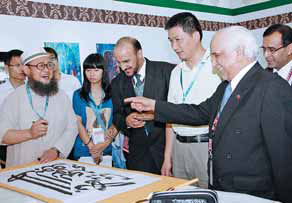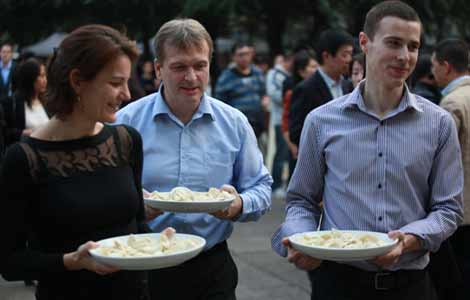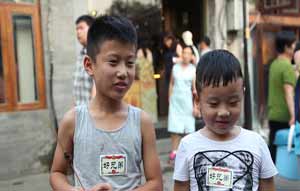Fair looks beyond stereotypes of Saudi lit
Updated: 2013-09-03 07:17
By Sun Ye (China Daily)
|
||||||||
|
Yahya Bin Abdul-Kareem Al-Zaid, ambassador of Saudi Arabia in China, chats with Ma Yiping, a calligrapher from Xi'an, at the Beijing book fair. Che Mei / China News |
Veils, robes, conservative and distant. If you still think of the Kingdom of Saudi Arabia this way, it's time to refresh the stereotype.
The kingdom, the country of honor at this year's Beijing International Book Fair, which closed on Sunday, turns out to have much in common with China. And not just in literature.
"Books about the conflicts between city and rural life are trending, the contradictions show the core issues the country is going through," Hassan M. Alnemi, a professor of literary critic with King Abdulaziz University, who spoke at a forum of "Interactions Between the Saudi Literature and the Chinese Literature".
In both countries, novels about rural life seem to get the most attention.
"The clashes of new and traditional values sit at the center of the genre. They show how the society is undergoing turbulent changes and people are learning to cope with it," says Alnemi. "Novels are the best observations of a society."
In literature as on other fronts, the two distant societies have been through largely synchronous and similar developments.
"Saudi Arabia had an 'explosion' of literature in the 1980s, as its economy started to soar around that period of time," says Zhang Hongyi, a professor with Beijing International Studies University and deputy director of Chinese Society for Arabic Literature Studies.
"At the same time, the Chinese economy also started to take off, and many creative art works started to come out."
In feminist literature, though the countries focus on different aspects, "Saudi Arabia had a crowd of outstanding women writers who vehemently called for their own rights in the 1980s. China also started to have its own group of women writers who wrote about the social responsibility of a woman (as compared to before, when their focus was asexual)," Zhang says.
Thirty years into unprecedented growth, the two countries now have found a similar need in shaping their national images.
"They've come to see that soft power is the key to their development today," Zhang says.
Zhang says China has to ditch its outdated impressions to appreciate the guest country. "Saudi Arabia is no longer the conservative, nomadic faraway country we used to have in mind. It is modern and open."
For the book fair, Saudi Arabia had 12 exhibitors and showcased more than 500 books.
A government-sponsored initiative has also translated 50 kinds of Arabic books into Chinese, which cover the country's history, geography and literature.
"Saudi Arabia is now charging ahead with its 'Look to the East' campaign. It's a good model to follow," Zhang adds.
sunye@chinadaily.com.cn
(China Daily 09/03/2013 page19)

 Victoria Beckham S/S 2014 presented during NYFW
Victoria Beckham S/S 2014 presented during NYFW
 'Despicable' minions upset Depp's 'Lone Ranger' at box office
'Despicable' minions upset Depp's 'Lone Ranger' at box office
 'Taken 2' grabs movie box office crown
'Taken 2' grabs movie box office crown
 Rihanna's 'Diamonds' tops UK pop chart
Rihanna's 'Diamonds' tops UK pop chart
 Fans get look at vintage Rolling Stones
Fans get look at vintage Rolling Stones
 Celebrities attend Power of Women event
Celebrities attend Power of Women event
 Ang Lee breaks 'every rule' to make unlikely new Life of Pi film
Ang Lee breaks 'every rule' to make unlikely new Life of Pi film
 Rihanna almost thrown out of nightclub
Rihanna almost thrown out of nightclub
Most Viewed
Editor's Picks

|

|

|

|

|

|
Today's Top News
Going green can make good money sense
Senate leader 'confident' fiscal crisis can be averted
China's Sept CPI rose 3.1%
No new findings over Arafat's death: official
Detained US citizen dies in Egypt
Investment week kicks off in Dallas
Chinese firm joins UK airport enterprise
Trending news across China
US Weekly

|

|








